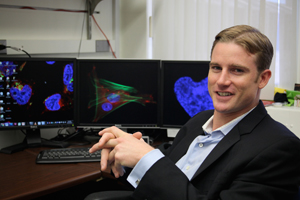October 24, 2011 - By Christopher Vaughan

Scott Metzler had once hoped to join the military, but he wound up choosing another career path — as a researcher — because of his congenital cardiac condition
For Scott Metzler, PhD, developmental cardiology is literally a subject close to his heart. Metzler is a postdoctoral scholar in pediatrics working with the Stanford Cardiovascular Institute researchers to understand how mechanical interactions between cells affect the function and development of the heart. He is also someone who was born with an extremely serious heart defect.
Metzler was born with Tetralogy of Fallot, a complex condition with three or four separate defects in the heart. Fixing each of these defects requires a long and intricate operation. The surgery is usually done when a child is very young, and children commonly have to undergo more operations as their bodies grow.
Metzler’s heart was repaired by surgeons at Yale in 1985, when he was 2. After the surgery, he had a fairly normal childhood, Metzler said. “I’ve been asymptomatic most of my life, thanks to the success of my first surgery,” he said.
“My parents went against the conventional wisdom at the time, which was not to stress the heart,” Metzler said. “Instead, they said I should do everything I could, which is what doctors tell patients now.”
Metzler continues to be athletic, playing golf, tennis, as well as surfing two or three times a week in front of his house in Ocean Beach, San Francisco. His congenital heart condition has affected his life, however. As the son of a Navy Seal and the brother of an Army Blackhawk helicopter pilot currently serving in Afghanistan, Metzler planned to join the military. “I wanted to be a battlefield surgeon, but when I turned 18 I was told that, because of my heart, that just wasn’t an option.”
Instead, he got a degree in bioengineering at UC-San Diego and then garnered a PhD in biomedical engineering from Mississippi State. Since coming to Stanford, he has been pursuing an interest in understanding the mechanical forces that shape the heart correctly as it develops in the womb. He also has collaborated with researchers on the development of the “confetti mouse,” in which embryonic heart cells are genetically tagged so that that will appear in different colors under fluorescent light. That could enable scientists to track the cells’ development as the heart grows. Another project Metzler is working on is studying the activity of apelin — a protein that is active in the heart and other tissues and may be helpful in understanding how to treat heart failure. Yet another project is developing a collagen patch that may be used in the future to promote new cell growth over tissue damaged by cardiac infarction.
Although Metzler has lived with few symptoms of his congenital disorder, his asymptomatic run is coming to an end. The valve between his right ventricle and pulmonary artery has become increasingly ineffective, leading to reflux and a thickening of the right ventricle wall. Metzler plans to get the valve replaced by cardiovascular surgeons at Stanford in December.
“Growing up, my cardiologists told me I would probably have to have the operation when I turned 18, so I’ve been extremely fortunate to keep the knife at bay for an extra 10 years or so,” he said.
Metzler observes that he is lucky in another way: “Some of the world’s foremost experts on these heart defects are the people I’m honored to work with every day, which makes my mother happy, knowing I’m in good hands,” he said.
Christopher Vaughan is the communications manager for the Stanford Cardiovascular Institute.
About Stanford Medicine
Stanford Medicine is an integrated academic health system comprising the Stanford School of Medicine and adult and pediatric health care delivery systems. Together, they harness the full potential of biomedicine through collaborative research, education and clinical care for patients. For more information, please visit med.stanford.edu.